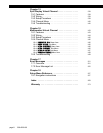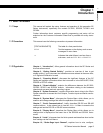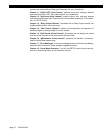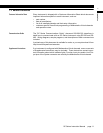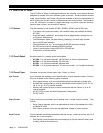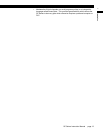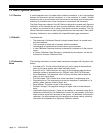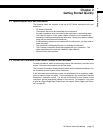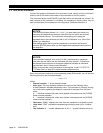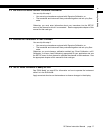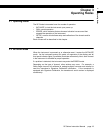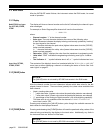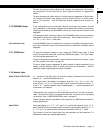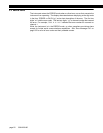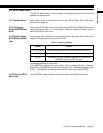
page 16 008-0608-00
2.3 Turn on the Instrument
Connect the power cord between the instrument power source and the instrument,
and turn the On/Off switch on the back of the instrument to the On position.
The instrument enters its INITIALIZE mode that lasts a few seconds per channel. As
each channel in the instrument is initialized, the transducer's serial number may be
seen on the display if the transducer has a Signature Calibration Module in it.
When the instrument enters its normal operating mode (RUN mode), you will see the
following format on the front panel display:
1
•
00000. PSIG
"
where:
• Channel number: “1” is the channel number.
• Value type: The next character indicates the nature of the following value.
A blank character indicates the tracking value. The instrument is “tracking” the sig-
nal, continuously updating the display in response to the signal from the trans-
ducer.
A “
•" character indicates the peak value (highest value seen since the [CLEAR]
button was last pressed).
A “
–" character indicates the valley value (lowest value seen since the [CLEAR]
button was last pressed).
• Data value: “00000.” displays the value from the transducer in engineering units.
• Units label: “PSIG” indicates the engineering units being used (up to 4 charac-
ters).
• Tare indicator: A “
"“ symbol indicates tare is off; a “Ë“ symbol indicates tare is on.
NOTICE
If the channel’s display flashes “
APPLY 00000.
” (or some other load value), the
instrument has detected a transducer other than the one which was last cali-
brated with that channel. The instrument is prompting you to apply the
requested load to the transducer so that a “mV/V Calibration” or a “Shunt Cali-
bration” can take place.
After making certain that the correct transducer is connected this channel,
press the [ENTER] button after you have applied the requested load to perform
the calibration.
NOTICE
If the instrument displays error code 57 or 68, it has detected a transducer
other than the one which was last calibrated with that channel. Furthermore,
the channel cannot perform an automatic calibration because its calibration
type has been set to “Known Load Calibration”.
Either re-connect the correct transducer to the channel, or see “
CALIBRATION
TYPE
Menu Item” on page 67 to select another calibration type.



